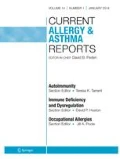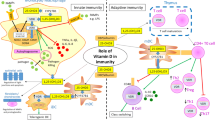Abstract
Epidemiologic studies highlight the increasing prevalence of vitamin D deficiency and insufficiency and its association with an increased risk of autoimmune diseases and poor respiratory function, including asthma. These and additional studies have raised interest in the immunomodulatory properties of vitamin D beyond its well-established role in calcium homeostasis and bone health. Vitamin D has been shown to influence the function of cells intrinsic to innate and adaptive immunity. This review discusses recent evidence that vitamin D promotes—both directly and indirectly—regulatory or suppressor T-cell populations with the capacity to inhibit inappropriate immune responses that cause disease, suggesting that this property may in part underpin the epidemiologic findings.

Similar content being viewed by others
References
Papers of particular interest, published recently, have been highlighted as: • Of importance
Mora JR, Iwata M, von Andrian UH: Vitamin effects on the immune system: vitamins A and D take centre stage. Nat Rev Immunol 2008:685–698.
Adams JS, Hewison M: Unexpected actions of vitamin D: new perspectives on the regulation of innate and adaptive immunity. Nat Clin Pract Endocrinol Metab 2008, 4:80–90.
• Hewison M: Vitamin D and the intracrinology of innate immunity. Mol Cell Endocrinol 2010, 321:103–111. This is an excellent overview highlighting the capacity for local synthesis of vitamin D in tissues and the effects on innate immunity.
Nassef M, Temparano J, Frieri M et al: Should Fracture Risk Influence Our Decision Making in Asthma Care? . Ann Allergy Asthma Immunol 2010, In press.
Hypponen E, Power C: Hypovitaminosis D in British adults at age 45 y: nationwide cohort study of dietary and lifestyle predictors. Am J Clin Nutr 2007, 85:860–868.
Brehm J M, Celedon J C, Soto-Quiros M E et al: Serum vitamin D levels and markers of severity of childhood asthma in Costa Rica. Am J Respir Crit Care Med 2009, 179:765–771.
Black P N, Scragg R: Relationship between serum 25-hydroxyvitamin D and pulmonary function in the third national health and nutrition examination survey. Chest 2005, 128:3792–3798.
Holick M: Vitamin D deficiency. The New England Journal of Medicine 2007, 357:266–281.
Sakaguchi S, Miyara M, Costantino CM, Hafler DA: FOXP3+ regulatory T cells in the human immune system. Nat Rev Immunol 2010, 10:490–500.
Sakaguchi S, Sakaguchi N, Asano M et al: Immunologic self-tolerance maintained by activated T cells expressing IL-2 receptor alpha-chains (CD25). Breakdown of a single mechanism of self-tolerance causes various autoimmune diseases. J Immunol 1995, 155:1151–1164.
Torgerson TR, Ochs HD: Immune dysregulation, polyendocrinopathy, enteropathy, X-linked: forkhead box protein 3 mutations and lack of regulatory T cells. J Allergy Clin Immunol 2007, 120:744-750; quiz 751–742.
Hawrylowicz CM, O’Garra A: Potential role of interleukin-10-secreting regulatory T cells in allergy and asthma. Nat Rev Immunol 2005, 5:271–283.
Murphy KM, Stockinger B: Effector T cell plasticity: flexibility in the face of changing circumstances. Nat Immunol 2010, 11:674–680.
Vignali DA, Collison LW, Workman CJ: How regulatory T cells work. Nat Rev Immunol 2008, 8:523–532.
Penna G, S Amuchastegui, N Giarratana, K C Daniel, M Vulcano, S Sozzani, Adorini L: 1,25-Dihydroxyvitamin D3 selectively modulates tolerogenic properties in myeloid but not plasmacytoid dendritic cells. The Journal of Immunology 2007, 178:145–153.
Szeles L, G Keresztes, D Torocsik, Z Balajthy, L Krenacs, S Poliska, A Steinmeyer, U Zuegel, M Pruenster, A Rot, et al.: 1,25-dihydroxyvitamin D3 is an autonomous regulator of the transcriptional changes leading to a tolerogenic dendritic cell phenotype. The Journal of Immunology 2009, 182:2074–2083.
Penna G, Adorini L: 1 Alpha,25-dihydroxyvitamin D3 inhibits differentiation, maturation, activation, and survival of dendritic cells leading to impaired alloreactive T cell activation. J Immunol 2000, 164:2405–2411.
Canning MO, Grotenhuis K, de Wit H et al: 1-alpha,25-Dihydroxyvitamin D3 (1,25(OH)(2)D(3)) hampers the maturation of fully active immature dendritic cells from monocytes. Eur J Endocrinol 2001, 145:351–357.
Penna G, Roncari A, Amuchastegui S et al: Expression of the inhibitory receptor ILT3 on dendritic cells is dispensable for induction of CD4+Foxp3+ regulatory T cells by 1,25-dihydroxyvitamin D3. Blood 2005, 106:3490–3497.
Unger WW, Laban S, Kleijwegt FS et al: Induction of Treg by monocyte-derived DC modulated by vitamin D3 or dexamethasone: differential role for PD-L1. Eur J Immunol 2009, 39:3147–3159.
Alroy I, T L Towers, Freedman LP: Transcriptional repression of the interleukin-2 gene by vitamin D3: direct inhibition of NFATp/AP-1 complex formation by a nuclear hormone receptor. Molecular and Cellular Biology 1995, 15:5789–5799.
Reichel H, Koeffler HP, Tobler A, Norman AW: 1 alpha,25-Dihydroxyvitamin D3 inhibits gamma-interferon synthesis by normal human peripheral blood lymphocytes. Proc Natl Acad Sci U S A 1987, 84:3385–3389.
Daniel C, Sartory NA, Zahn N et al: Immune modulatory treatment of trinitrobenzene sulfonic acid colitis with calcitriol is associated with a change of a T helper (Th) 1/Th17 to a Th2 and regulatory T cell profile. J Pharmacol Exp Ther 2008, 324:23–33.
Tang J, Zhou R, Luger D et al: Calcitriol suppresses antiretinal autoimmunity through inhibitory effects on the Th17 effector response. J Immunol 2009, 182:4624–4632.
Boonstra A, Barrat FJ, Crain C et al: 1alpha,25-Dihydroxyvitamin d3 has a direct effect on naive CD4(+) T cells to enhance the development of Th2 cells. J Immunol 2001, 167:4974–4980.
Wittke A, Weaver V, Mahon BD et al: Vitamin D receptor-deficient mice fail to develop experimental allergic asthma. J Immunol 2004, 173:3432–3436.
Jirapongsananuruk O, Melamed I, Leung DY: Additive immunosuppressive effects of 1,25-dihydroxyvitamin D3 and corticosteroids on TH1, but not TH2, responses. J Allergy Clin Immunol 2000, 106:981–985.
Pichler J, Gerstmayr M, Szepfalusi Z et al: 1 alpha,25(OH)2D3 inhibits not only Th1 but also Th2 differentiation in human cord blood T cells. Pediatr Res 2002, 52:12–18.
Staeva-Vieira TP, Freedman LP: 1,25-dihydroxyvitamin D3 inhibits IFN-gamma and IL-4 levels during in vitro polarization of primary murine CD4+ T cells. J Immunol 2002, 168:1181–1189.
Ito T, Wang YH, Duramad O et al: TSLP-activated dendritic cells induce an inflammatory T helper type 2 cell response through OX40 ligand. J Exp Med 2005, 202:1213–1223.
• Hypponen E, Berry DJ, Wjst M, Power C: Serum 25-hydroxyvitamin D and IgE - a significant but nonlinear relationship. Allergy 2009, 64:613–620. This study of patients, together with the article by Urry et al. [32], begins to make sense of the confusion in the scientific literature regarding the contradictory reports of vitamin D on Th2 allergic-type responses.
Urry Z, E Xystrakis, D F Richards et al: Ligation of TLR9 induced on human IL-10-secreting Tregs by 1α,25-dihyrdoxyvitamin D3 abrogates regulatory function. The journal of Clinical Investigation 2009, 119:387–398.
Kreindler JL, Steele C, Nguyen N et al.: Vitamin D3 attenuates Th2 responses to Aspergillus fumigatus mounted by CD4+ T cells from cystic fibrosis patients with allergic bronchopulmonary aspergillosis. J Clin Invest 2010.
• Adorini L, Penna G: Induction of tolerogenic dendritic cells by vitamin D receptor agonists. Handb Exp Pharmacol 2009:251–273. This is a review on the capacity of vitamin D to induce tolerogenic DCs with Treg responses from a group that has contributed extensively in this area.
Jeffery LE, Burke F, Mura M et al: 1,25-Dihydroxyvitamin D3 and IL-2 combine to inhibit T cell production of inflammatory cytokines and promote development of regulatory T cells expressing CTLA-4 and FoxP3. J Immunol 2009, 183:5458–5467.
Chang JH, Cha HR, Lee DS et al: 1,25-Dihydroxyvitamin D3 inhibits the differentiation and migration of T(H)17 cells to protect against experimental autoimmune encephalomyelitis. PLoS One 2010, 5:e12925.
Mucida D, Park Y, Cheroutre H: From the diet to the nucleus: vitamin A and TGF-beta join efforts at the mucosal interface of the intestine. Semin Immunol 2009, 21:14–21.
Barrat F J, Cua D, Boonstra A et al: In vitro generation of interleukin 10-producing regulatory CD4+ T cells is induced by immunosuppressive drugs and inhibited by T helper 1 (Th1)- and Th2-induced cytokines. Journal of Experimental Medicine 2002, 195:603–616.
Sutmuller RP, Morgan ME, Netea MG et al: Toll-like receptors on regulatory T cells: expanding immune regulation. Trends Immunol 2006, 27:387–393.
Schauber J, Dorschner RA, Coda AB et al.: Injury enhances TLR2 function and antimicrobial peptide expression through a vitamin D-dependent mechanism. J Clin Invest 2007, 117:803–811.
Zittermann A, Dembinski J, Stehle P: Low vitamin D status is associated with low cord blood levels of the immunosuppressive cytokine interleukin-10. Pediatr Allergy Immunol 2004, 15:242–246.
Hawrylowicz C, Richards D, Loke T-K et al: A defect in corticosteroid-induced IL-10 production in T lymphocytes from corticosteroid-resistant asthmatic patients. The Journal of Allergy and Clinical Immunology 2002, 109:369–370.
Xystrakis E, Kusumakar S, Boswell S et al: Reversing the defective induction of IL-10-secreting regulatory T cells in glucocorticoid-resistant asthma patients. J Clin Invest 2006, 116:146–155.
Searing DA, Zhang Y, Murphy JR et al: Decreased serum vitamin D levels in children with asthma are associated with increased corticosteroid use. J Allergy Clin Immunol 2010, 125:995–1000.
Heine G, Niesner U, Chang HD et al: 1,25-dihydroxyvitamin D(3) promotes IL-10 production in human B cells. Eur J Immunol 2008, 38:2210–2218.
Gregori S, M Casorati, S Amuchastegui et al: Regulatory T cells induced by 1α,25-Dihydroxyvitamin D3 and mycophenolate mofetil treatment mediate transplantation tolerance. The Journal of Immunology 2001, 167:1945–1953.
Gregori S, N Giarratana, S Smiroldo et al: A 1α,25-dihydroxyvitamin D3 analog enhances regulatory T-cells and arrests autoimmune diabetets in NOD mice. Diabetes 2002, 51:1367–1374.
Cantorna MT, Hayes CE, DeLuca HF: 1,25-Dihydroxycholecalciferol inhibits the progression of arthritis in murine models of human arthritis. J Nutr 1998, 128:68–72.
Gorman S, Kuritzky LA, Judge MA et al: Topically applied 1,25-dihydroxyvitamin D3 enhances the suppressive activity of CD4+CD25+ cells in the draining lymph nodes. J Immunol 2007, 179:6273–6283.
Ghoreishi M, Bach P, Obst J et al: Expansion of antigen-specific regulatory T cells with the topical vitamin d analog calcipotriol. J Immunol 2009, 182:6071–6078.
Lloyd CM, Hawrylowicz CM: Regulatory T cells in asthma. Immunity 2009, 31:438–449.
Taher YA, van Esch BC, Hofman GA et al: 1alpha,25-dihydroxyvitamin D3 potentiates the beneficial effects of allergen immunotherapy in a mouse model of allergic asthma: role for IL-10 and TGF-beta. J Immunol 2008, 180:5211–5221.
Sigmundsdottir H, Pan J, Debes G F et al: DCs metabolize sunlight-induced vitamin D3 to ‘program’ T cell attraction to the epidermal chemokine CCL27. Nature Immunology 2007, 8:285–293.
Smolders J, Thewissen M, Peelen E et al: Vitamin D status is positively correlated with regulatory T cell function in patients with multiple sclerosis. PLoS One 2009, 4:e6635.
Mahon BD, Wittke A, Weaver V, Cantorna MT: The targets of vitamin D depend on the differentiation and activation status of CD4 positive T cells. J Cell Biochem 2003, 89:922–932.
Acknowledgments
Miss Chambers is a recipient of a Medical Research Council British Thoracic Society Capacity Building PhD studentship. The authors have received financial support from Asthma UK and the Department of Health via the National Institute for Health Research comprehensive Biomedical Research Centre award to Guy’s and St. Thomas’ National Health Service Foundation Trust in partnership with King’s College London and King’s College Hospital National Health Service Foundation Trust.
Disclosure
No potential conflicts of interest relevant to this article were reported.
Author information
Authors and Affiliations
Corresponding author
Rights and permissions
About this article
Cite this article
Chambers, E.S., Hawrylowicz, C.M. The Impact of Vitamin D on Regulatory T Cells. Curr Allergy Asthma Rep 11, 29–36 (2011). https://doi.org/10.1007/s11882-010-0161-8
Published:
Issue Date:
DOI: https://doi.org/10.1007/s11882-010-0161-8




